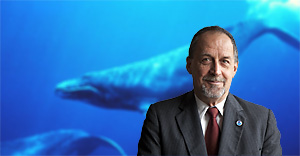Speaker: Richard Merrick, Director, Scientific Programs and Chief Science Advisor, NOAA Fisheries
Resilient, productive ocean fisheries are critical to coastal economies and ways of life. NOAA Fisheries has developed an agency-wide Ecosystem-based Fishery Management (EBFM) policy, which outlines a set of principles to guide NOAA’s actions and decisions on the management of ocean fisheries over the long-term. The Policy and the accompanying Roadmap ensure our commitment to ecosystem-based fishery management—an integrated, science-based approach that includes consideration of the entire ecosystem, including people– into the agency’s resource management decisions.
 Dr. Richard Merrick began serving as Director, Scientific Programs and Chief Science Advisor in September 2011. In this capacity, he leads NOAA Fisheries’ efforts to provide the science needed to support sustainable fisheries and ecosystems and to continue our country’s progress in ending overfishing, rebuilding fish populations, saving critical species, and preserving vital habitats. As the head of NOAA Fisheries’ scientific operations, Dr. Merrick directs NOAA’s six regional Fisheries Science Centers, including 30 NOAA Fisheries laboratories. He joined NOAA Fisheries in 1985 as an oceanographer at the Alaska Fisheries Science Center conducting ecological field research from then through 1997 in the Aleutian Islands, Bering Sea and Arctic. In 1997, he transferred to the Northeast Fisheries Science Center, (in Woods Hole, MA) where he initially served as Branch Chief for Protected Species, and then as Chief of the Resource Evaluation and Assessment Division where he directed this Center’s assessment, ecological, and social-science research for fish and protected species. He has led various regional and national efforts to improve fishery and protected resources science, and has broad experience in dealing with a wide variety of controversial fishery and protected species. Dr. Merrick’s education includes a Ph.D. in fisheries from the University of Washington; a master’s of science degree in biological oceanography as well as a master’s degree in marine resource management from Oregon State University; and a master’s degree in city and regional planning and a bachelor of science degree from Clemson University.
Dr. Richard Merrick began serving as Director, Scientific Programs and Chief Science Advisor in September 2011. In this capacity, he leads NOAA Fisheries’ efforts to provide the science needed to support sustainable fisheries and ecosystems and to continue our country’s progress in ending overfishing, rebuilding fish populations, saving critical species, and preserving vital habitats. As the head of NOAA Fisheries’ scientific operations, Dr. Merrick directs NOAA’s six regional Fisheries Science Centers, including 30 NOAA Fisheries laboratories. He joined NOAA Fisheries in 1985 as an oceanographer at the Alaska Fisheries Science Center conducting ecological field research from then through 1997 in the Aleutian Islands, Bering Sea and Arctic. In 1997, he transferred to the Northeast Fisheries Science Center, (in Woods Hole, MA) where he initially served as Branch Chief for Protected Species, and then as Chief of the Resource Evaluation and Assessment Division where he directed this Center’s assessment, ecological, and social-science research for fish and protected species. He has led various regional and national efforts to improve fishery and protected resources science, and has broad experience in dealing with a wide variety of controversial fishery and protected species. Dr. Merrick’s education includes a Ph.D. in fisheries from the University of Washington; a master’s of science degree in biological oceanography as well as a master’s degree in marine resource management from Oregon State University; and a master’s degree in city and regional planning and a bachelor of science degree from Clemson University.


